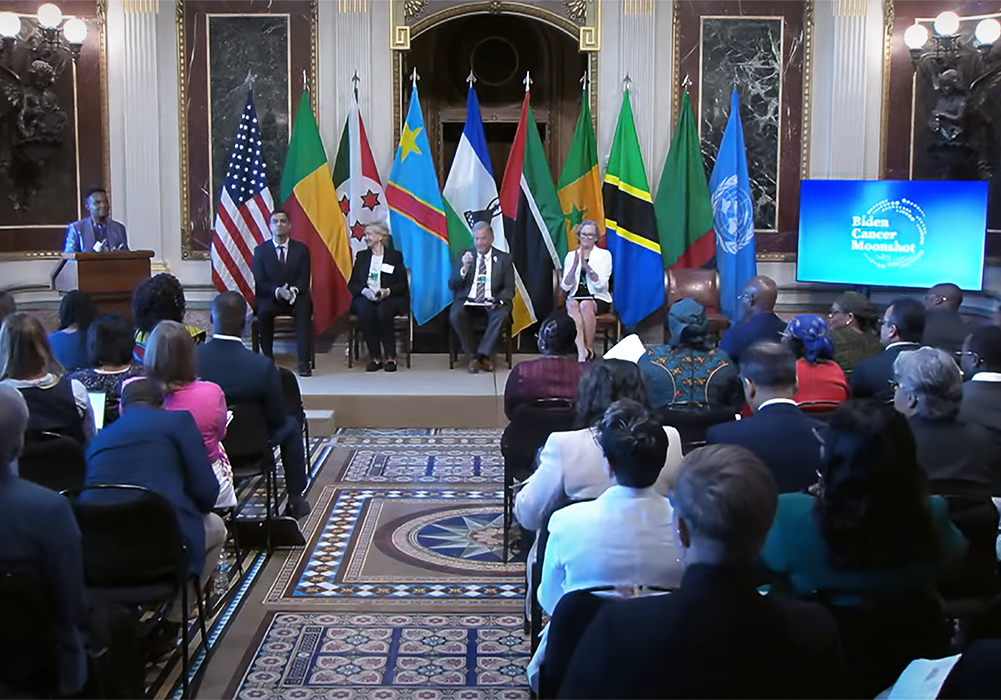Ending cancer as we know it doesn’t stop at U.S. borders. Truly transforming the burden of cancer around the world requires shared vision and action, participants said during the July 2024 White House Africa Cancer Forum.
“No one nation can solve a complex disease like cancer alone, but together, we can develop and share new ways to ease the burden on patients and their loved ones,” the White House said in a press announcement following the forum. “That is why the Biden Cancer Moonshot is announcing new actions across the Cancer Cabinet and the private sector.”
The Moonshot is backing those actions with more than $100 million in new funding to decrease the cancer burden in Africa, including:
- Rays of Hope, an International Atomic Energy Agency initiative that is expanding access to life-saving cancer radiotherapy treatments in Africa, will provide $6 million to the U.S. Department of State and Department of Energy to assist developing countries in building capacity to detect and treat cancer.
- The Centers for Disease Control and Prevention will support and implement programs aimed at encouraging conversations increase knowledge and access to human papillomavirus vaccination, cervical cancer screening, and treatment among girls and women in Kenya.
- The National Cancer Institute (NCI) is committing $6 million and partnering with Roche and investigators in Kenya and Malawi to conduct one of the first cancer immunotherapy clinical trials in Africa to evaluate the safety and efficacy of atezolizumab for children, adolescents, and adults with lymphomas caused by Epstein-Barr virus. The trial provides new treatment options to patients who have not been cured by standard chemotherapy.
- NCI is also funding eight awards totaling nearly $24 million to support new implementation science teams working with diverse settings, populations, interventions, and cancer types to promote the adoption and integration of evidence-based practices, interventions, and policies into public health settings to improve cancer outcomes.
- NCI is also funding $15 million to support researchers and healthcare providers in low- and middle-income countries to develop cost-effective new technologies for diverse settings, populations, and cancer types.
Among the private sector’s contributions are:
- Northwestern University Center for Global Oncology is launching the West Africa-U.S. Cancer Prevention and Control Initiative with an $18 million investment to develop and implement evidence-based screening, diagnostic, and treatment tools in West Africa, particularly for infection-associated cancers, and training early-career West African scientists in cancer research.
- Amazon Web Services (AWS) is launching the AWS Children’s Innovation Initiative with a $10 million commitment to help organizations harness cloud technology to advance global pediatric health, including cancer detection and treatment.
- Several investments in cervical cancer screening and treatment from organizations such as MD Anderson, the Sabin Vaccine Institute, the Elekta Foundation, and Becton, Dickinson, and Company.
Additionally, organizations announced the launch of new studies to better understand the context of cancer in Africa, including:
- The University of Miami’s Sylvester Comprehensive Cancer Center expanded a multicenter study to Nigeria in July 2024 to identify drivers of health inequities, genetic characteristics specific to African heritage, and environmental factors that improve the ongoing effects of medical treatment for women with ovarian cancer.
- Moffitt Cancer Center, Vanderbilt University Medical Center, the German Cancer Research Center, Stellenbosch University, and the University of Zimbabwe are joining forces for the Partnership to Assess Viral and Immune Landscape Intersections with Oncology for People Living with HIV, a $5.5 million program to expand research of understudied, virus-associated cancers that disproportionately affect people living with HIV.
Finally, several organizations announced investments in oncology workforce development in Africa, including:
- Global Health Catalyst is funding $2 million for global oncology education and training, particularly in leveraging advanced information and communication technologies and artificial intelligence.
- RevitaLash Cosmetics and City of Hope’s Ethiopia Breast Cancer Initiative are opening the Hawassa University Comprehensive Specialized Hospital Cancer Treatment Center with goals to scale up train-the-trainer and nursing faculty training programs that will support improved breast cancer pathology practices in the region.
- BIO Ventures for Global Health is increasing its workforce cancer training initiatives to strengthen 7,500 healthcare professionals’ patient management skills and improve patient referral systems.
- The American Society of Clinical Oncology will work with Tikur Anbessa Specialized Hospital in Addis Ababa, Ethiopia, to provide intensive training and build capacity in interprofessional cancer care, palliative care, and quality of care measurement and improvement.
Find the full list of funding and action announcements in the White House fact sheet.
ONS and its members are transforming cancer care in Africa and around the world through global initiatives. Read how ONS members and staff provided chemotherapy training in Ethiopia, a retired ONS member volunteers her time for an Ethiopian cancer association, and ONS and members provided books and radiation training for an Ethiopian delegation to the United States, then learn how you can get involved in global volunteer opportunities and other international initiatives.






